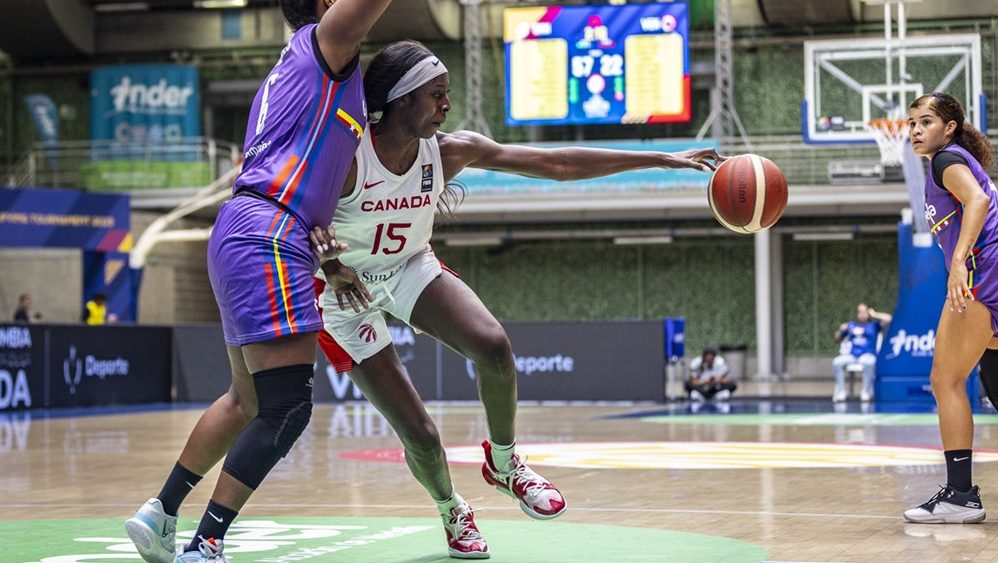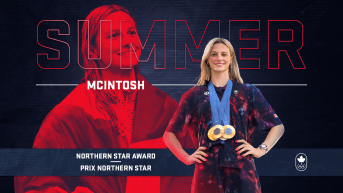Women’s basketball squad goals: Olympic qualification and leaving the game better than they found it
Saying that the strength of a team is the sum of its players might seem like stating the obvious. But that’s not what three-time Olympian Natalie Achonwa is trying to get at when describing Canada’s senior women’s national basketball team.
What she really means is that, “It could be anyone’s day for us. I think the fact that we don’t rely on only one or two people [as stars], is definitely a strength of ours, and it has been for some time now.”
And Achonwa would know, because she’s been around for some time. The 31-year-old made history in 2009 when she became the youngest player to be selected to the Canadian senior national team. She was only 16 years old. Achonwa currently plays professionally for the Minnesota Lynx in the WNBA.
The ability of Team Canada to gel together quickly and the stability that comes from having a solid core of experienced players has helped combat the fact that players have less and less time together before tournaments. Many members of the senior national team play for WNBA teams or in overseas leagues.
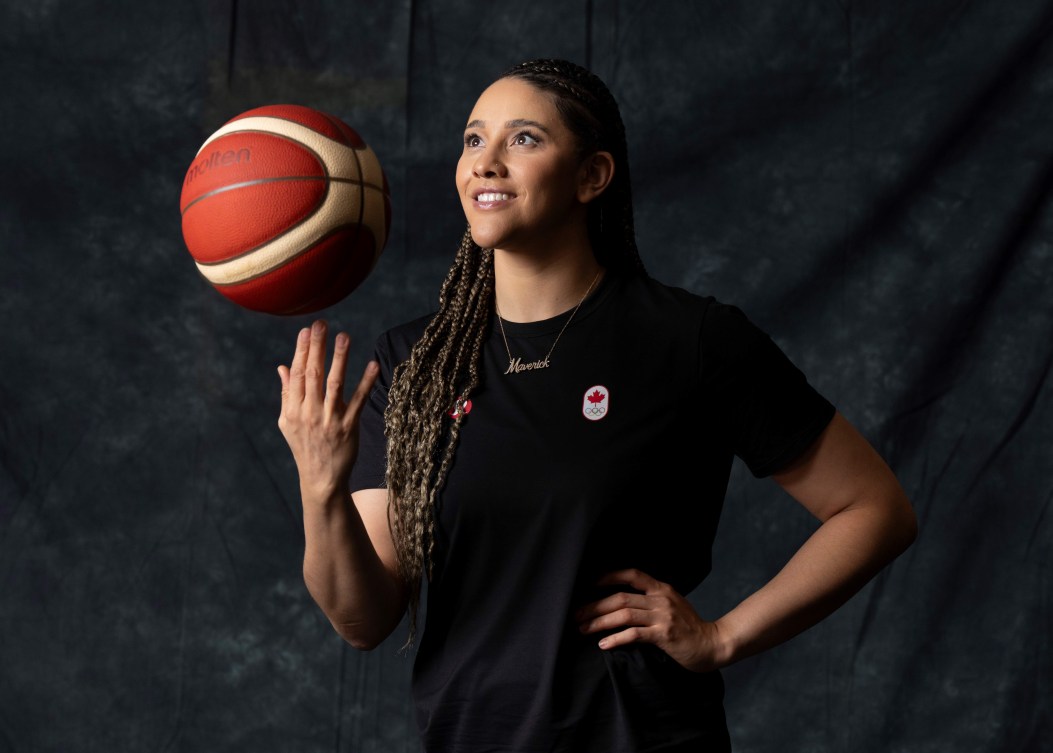
“We take every opportunity we have together and optimize it,” says two-time Olympian Nirra Fields.
And it’s been working. Team Canada has been gathering momentum for years. They’re currently on the hunt to secure an Olympic spot to make a fourth straight appearance at the Games.
The team finished fourth at the 2022 FIBA Women’s Basketball World Cup–the program’s best finish since placing third in 1986. They came away with the bronze medal at the 2023 FIBA Women’s AmeriCup, marking the program’s seventh medal in the last eight editions of the event, stretching back to 2009.
That bronze medal gained them entry to the FIBA Americas Women’s Olympic Pre-Qualifying Tournament, which took place in Colombia this past November. Team Canada swept the tournament, booking their slot in one of the four FIBA Women’s Olympic Qualifying Tournaments, set to take place in February.
The Olympic Pre-Qualifying Tournament was Captain Achonwa’s first-time donning the Team Canada jersey after her maternity leave. Her son, Maverick, who was born in April, travelled with the team to Colombia.
“For him to be in these environments might not be something he remembers, but they will be in his photo album. I will make sure he knows the stories,” Achonwa says. “[Returning to play postpartum] is definitely one of the hardest things I’ve ever done. But it also gives me this renewed strength to know that I can continue to persevere–I can grow a human and come back and compete on the highest level.”
Team Canada was buoyed by Achonwa’s return, and also by the leadership of their new-ish coach, Víctor Lapeña, who came aboard in 2022. Achonwa, fittingly, describes Lapeña as being a great fit in part because of his “dad vibe.”
“He will challenge you, he will call you on stuff and he will hold you accountable. But he will also be your biggest cheerleader,” Achonwa explains.
Her teammate Laeticia Amihere agrees with Achonwa’s assessment.
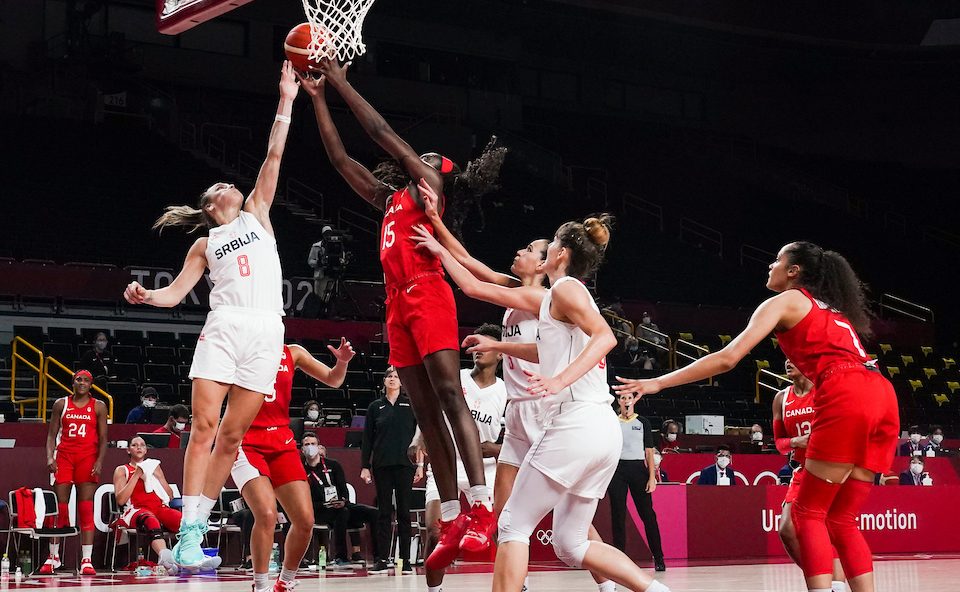
“He has so much energy, so much passion, and a lot of vision. I think he sees a lot in us and holds us to that standard,” says Amihere, who at age 22 has one Olympic appearance under her belt already. She plays in the WNBA for the Atlanta Dream.
Lapeña has inherited a program with a depth of skill and experience, including many players who have gone through and learned from more than one Olympic cycle.
For the veteran Achonwa, each Olympic experience helps her bring something to the table.
“For London 2012, we were the last team to qualify and we qualified on Canada Day,” she says. “It felt like we snuck in and so we were really happy just to be there.
“Then with Rio 2016, there was more expectation rather than hope that we would qualify a spot. Fast forward to Tokyo 2020, and the attitude was ‘medal or bust’ and that was kind of overbearing. I think we suffocated our dream. From all of these experiences, the learning is to enjoy the process, focus on the process and let the work speak for itself.”
For Fields, her two Olympic cycles left a similar impression: “My personal takeaway was that past success doesn’t guarantee future success. We can’t take anything for granted. Every Olympics is different and we have to earn it.”
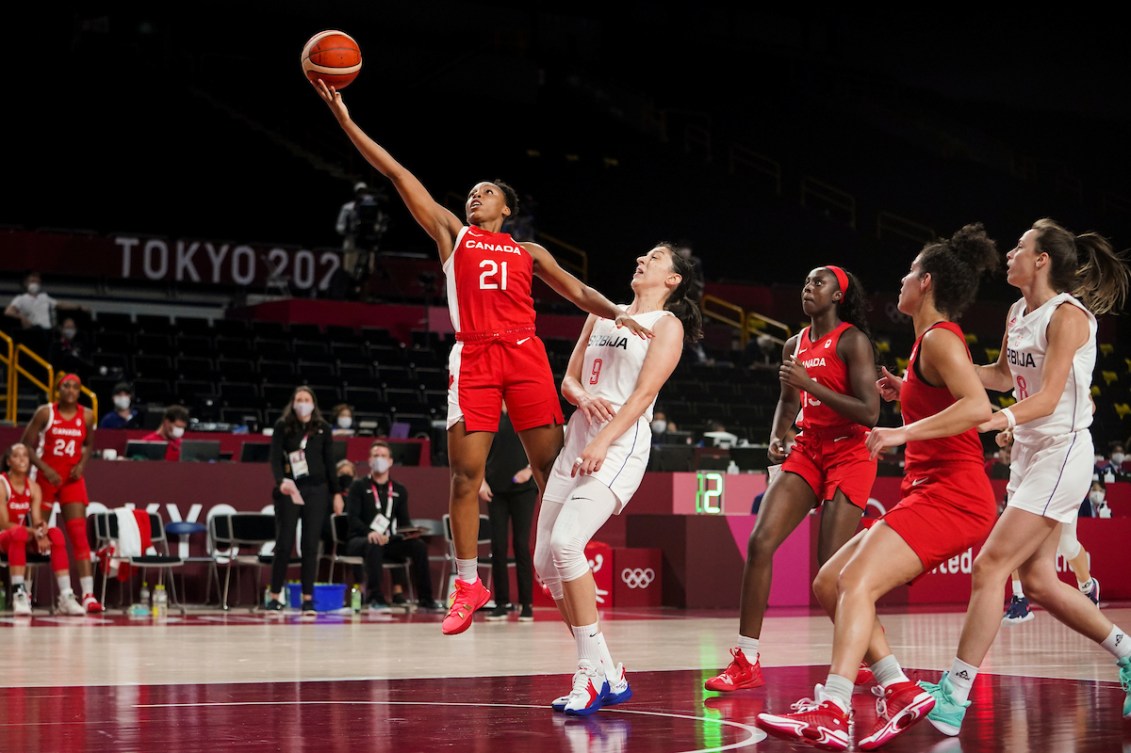
For the women of Team Canada, it is important that their Olympic journey also involves nurturing and advocating for the next generation of players.
“I got into sport because my brothers played,” Amihere says. “But my parents couldn’t afford another person to play sports. I got the opportunity through a coach who waived my fees. I think about that a lot–there’s a lot of girls like me who don’t have opportunities. Creating a path for them not only to get to the WNBA or play professionally, but also just to have an opportunity to be active and meet people and learn key skills is so important.”
The importance of mentorship is a throughline for all the players.
“I started playing basketball by accident,” Achonwa explains. “So for me, having people to guide me was huge in getting me where I am today. And that’s been ingrained in my ‘why’–I do this to hopefully provide an easier path for the generation after and leave the game better than I found it.”
The athletes interact with youth players most often through camps, workshops, and speaking engagements. Fields recounts that at a recent camp, she was bombarded with career questions by young hopeful players.
“There’s a demand from girls who really want to play, but don’t have the guidance. I feel like I have the opportunity to help them moving forward.”
And while all of them place an emphasis on supporting girls and women in the game, Achonwa reminds us that representation isn’t important solely for girls.
“I want young girls to see themselves in us and accomplish these things and challenge the impossible. But it’s also so important for young boys to see women in these roles–to see women that are competitive, gritty, strong leaders–that’s vital to where our world is going to go.”
There will be 16 teams competing in the four FIBA Women’s Olympic Qualifying Tournaments taking place February 8-11. That includes France and the United States, both of which are already qualified for Paris 2024 as the host nation and 2022 FIBA World Cup Champions, respectively. That leaves 10 Olympic spots up for grabs.
Team Canada will take part in the Qualifying Tournament hosted in Sopron, Hungary. Ranked fifth in the world, they will play in a group with Spain (No. 4), Japan (No. 9), and Hungary (No. 19). Three of those teams will secure their tickets to Paris 2024.

